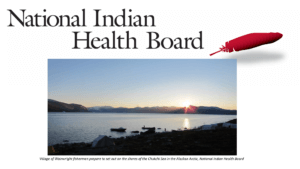Introducing the National Indian Health Board Climate Ready Tribes Initiative
Every summer when I was a child, my father took my brother and me over to our Blackfeet reservation near Browning, Montana, for a big family reunion. While I looked forward to seeing my elders and cousins, horseback riding, and storytelling, I would get most excited about another season of huckleberry picking. I can close my eyes right now and feel the warm summer breeze that whips from the mountains and sings through the sweetgrass hills, while whispering through my hair the songs my ancestors sung as they gathered their foods. These warm memories of harvesting berries in the sun, with my fingers stained purple, and eating at least one berry for every three that were picked have been shared in my Tribe since time immemorial. For our people, food is not just a form of subsistence. Traditional foods, also termed “first foods”, are important for our spiritual and cultural identity. They are a way of knowing whether our land and spirits are healthy. Unfortunately, our land’s health is declining due to climate change, and if we do not act to reverse these damages, our children might not have the chance to continue our berry picking songs.


It is important to understand that American Indian and Alaska Native (AI/AN) people generally define health more holistically than non-Native populations. Environmental damage causes significant harm not only to physical health but also to general wellbeing. This includes damages to homes, cultural sites, and sources of income or subsistence for AI/AN peoples and our traditional ways of life. Therefore, health suffers not only when Tribal people experience physical problems, but also when we are deprived of our connection to the lands, cultures, and traditions of our people.
Although North America’s First People contribute the least to environmental and climate damage, they are often the first and most severely affected by harmful impacts to the environments. For thousands of years, American Indians and Alaska Natives (AI/AN) have demonstrated tremendous respect for this planet, living in harmony with their environments, and taking only what they needed from the earth for physical, cultural, and spiritual purposes. Today, Tribes are incredibly vulnerable to the health effects associated with climate change for a variety of reasons, especially because there are already existing health disparities in Native communities. For example, people suffer from much higher rates of chronic lower respiratory diseases. When air quality decreases, our people are vulnerable to dangerous asthma attacks and other chronic respiratory disorders. Climate change has also led to extreme weather events such as floods, droughts, and wildfires, which have already destroyed homes, damaged nutritious subsistence resources, and reduced access to safe drinking water.
However, while Tribal communities are disproportionately impacted by climate change, we are extremely resilient. As Swinomish Indian Tribal Community Elder, Larry Campbell, stated, “We have been here 10,000 years and we will be here for 10,000 more”. The National Indian Health Board seeks to reaffirm this statement by building Tribal capacity to achieve the highest level of health and well-being for our people. With funding provided by the Centers for Disease Control and Prevention, goal of the Climate Ready Tribes Program is to increase Tribal knowledge and awareness of climate change, enhance the ability to recognize climate threats to communities, and to provide support for Tribes to take action against imminent threats of climate change. One of the ways we are doing this is supporting Tribes to conduct local climate and health related work. NIHB has been working with a new cohort of funded Tribes: Lummi Nation (Washington State), the Pala Band of Mission Indians (California), and the Sitka Tribe of Alaska (Alaska). The new awardees join the previous cohort: Swinomish Indian Tribal Community (Washington State), the Village of Wainwright (Alaska), and the Blackfeet Nation (Montana). Our second cohort of Tribes are working on diverse activities that relate to their community needs, which you will read more about over the course of this month’s blog series.
It is the National Indian Health Board’s pleasure to introduce our three Climate Ready Tribes’ award recipients over the next month who have developed unique ways to address the changing climate. With these initiatives, we hope to lead the way in developing adaptation plans for Tribal communities that are inclusive, culturally respectful, and allow for Tribes to act towards reversing climate change.
Mattie Curry, MPH, is the Public Health Policy and Program Coordinator at the National Indian Health Board.
The National Indian Health Board and Climate for Health are partnering throughout November for National Native American Heritage Month to amplify Tribal leadership on climate solutions. You can learn more about NIHB’s Climate Ready Tribes Program here.